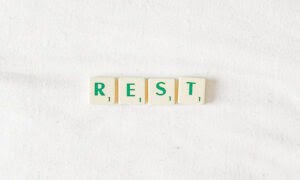Struggling with gut issues is hard. Many of our clients experience symptoms beyond constipation and bloating, often finding that their gut symptoms correlate with their mood. Because it’s Mental Health Awareness Month, I want to bring light to the hidden side effects of having digestive issues and give you 3 tangible ways to reduce your anxiety by prioritizing your gut health.
If you’ve dealt with digestive issues for any amount of time, you may experience any of the following:
- Depression
- Fatigue
- Pain
- Insecurity
- Fear of food
- Body distrust
- Self-doubt
- Strained relationships
- Isolation
- Missed opportunities
The list could go on. When you feel 6 months pregnant with bloat by the end of the day, this takes a toll on the capacity that you have for other things in your life. As a result, you may start feeling resentful towards your body, feel embarrassed, ashamed, or angry. You may feel you are doing “everything right” to manage your bloat and constipation yet your body still is not complying with your efforts. No matter what feelings you have, please know that you are not alone.
Trust me, I have been there and so have my clients.
The good news is that there are SO many things you can do to support your anxiety by supporting your gut.
Your gut and your brain are connected through a powerful superhighway called the vagus nerve. The vagus nerve is a bi-directional pathway, meaning that your gut sends messages to your brain and your brain sends messages to your gut. Simply put, what’s going on in your gut impacts your brain, and vice versa.
Often with clients, we get into a “chicken or egg” scenario with what came first – the gut issues, or the mental health struggles. At the end of the day, it’s important to support BOTH centers since they do communicate with each other.
Here are 3 ways you can support your gut (and in turn, support your brain):
- Add foods high in omega-3 fatty acids. Salmon, mackerel, flax seeds and chia seeds are all high in omega-3s. Research shows that omega-3 levels reduce inflammation in the gut (and therefore the brain), and they also help to increase gut diversity. The more diverse your gut microbiota (the bacterial population) is, the happier your brain and your body are!
- Eat more prebiotic-rich foods. Asparagus, onions, garlic, leeks, chicory, and jicama are just a few foods that contain prebiotic fiber. This is the type of fiber that feeds your good gut bacteria, therefore creating more diversity in your gut.
- Focus on healthy digestion by getting into a “rest and digest” state. This includes when you sit down to eat, and resting at night. To get into a “rest and digest” state before meals, take a few really deep breaths to calm your nervous system. You can practice box breathing, which is a technique that I teach my gutTogether clients. Simply breathe in for 4 seconds, hold for 4 seconds, breathe out for 4 seconds, and hold for 4 seconds. Don’t forget that “resting and digesting” also includes making sure you are getting adequate sleep!
Remember, your mental health is just as important as your physical health. Taking time to prioritize your gut health and your mental health can have immediate benefits on the gut-brain connection. You deserve a life free of gut symptoms, free of worrying about your stomach and free to eat the foods that bring you joy (without the unwanted GI side effects). Keep advocating for yourself!
With the proper support, know that it is possible to find food freedom and bloat relief.









